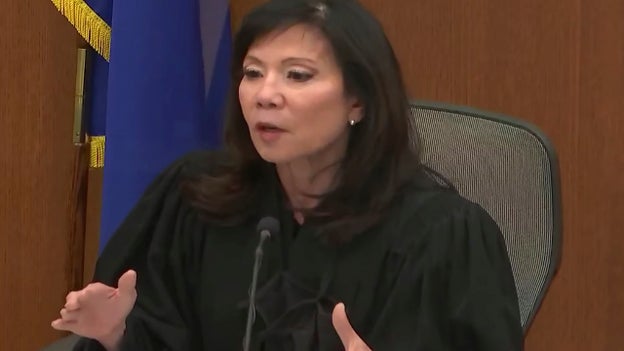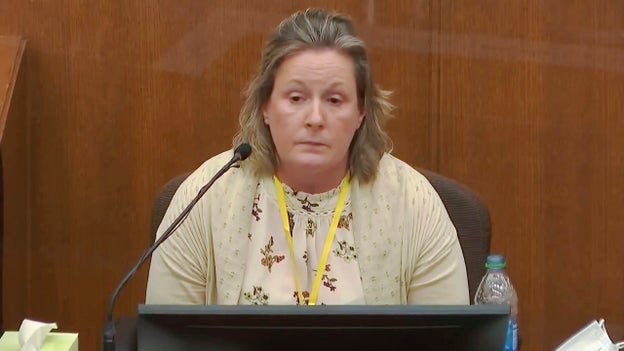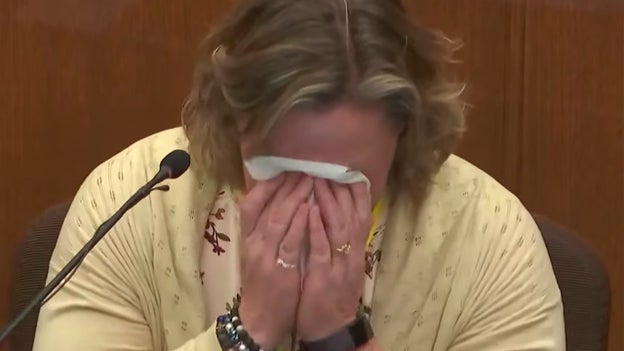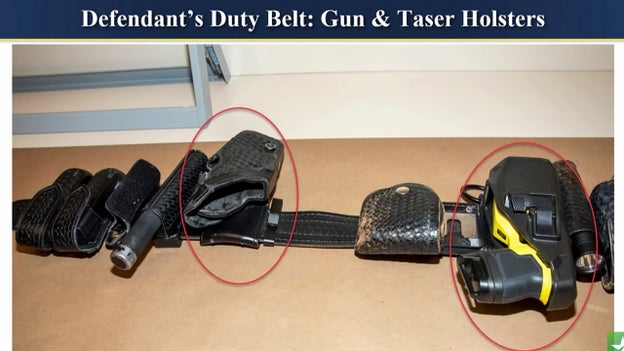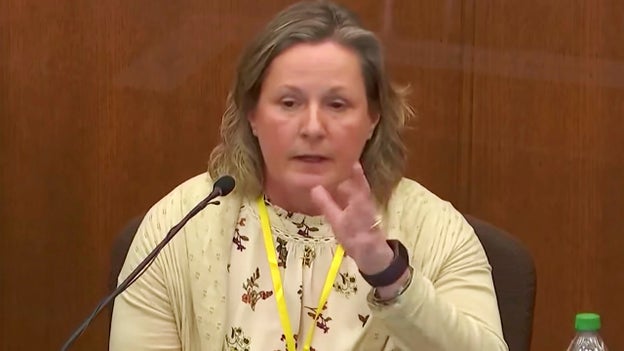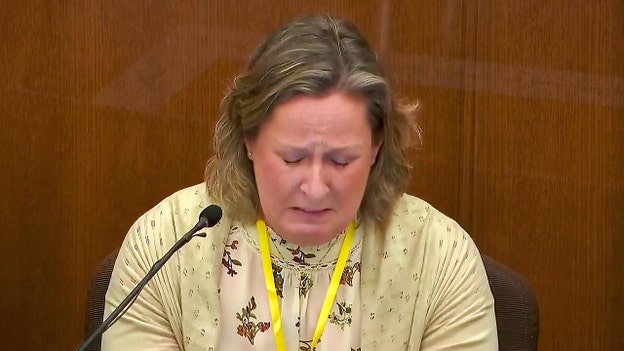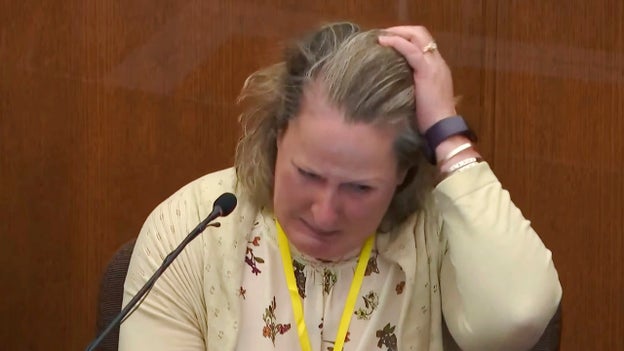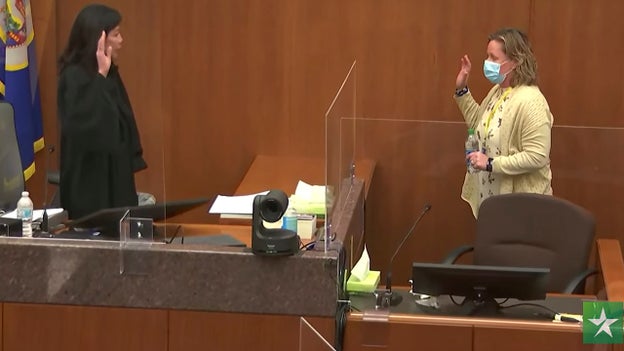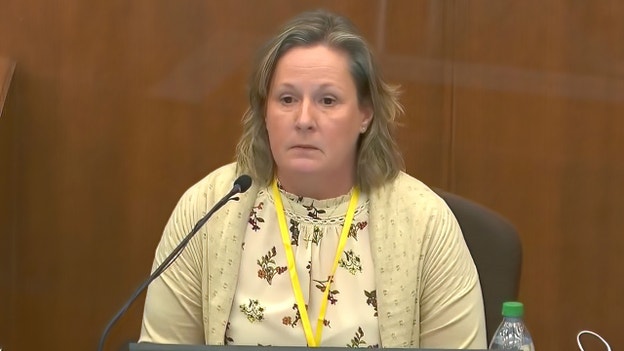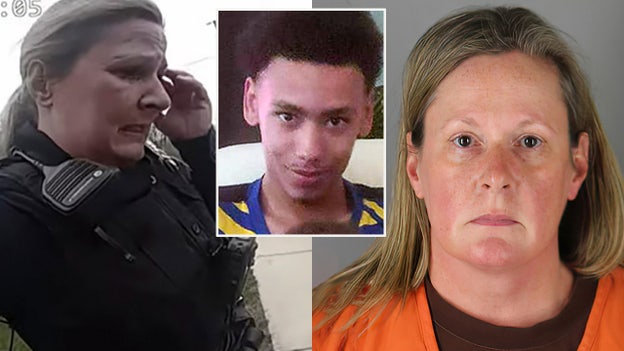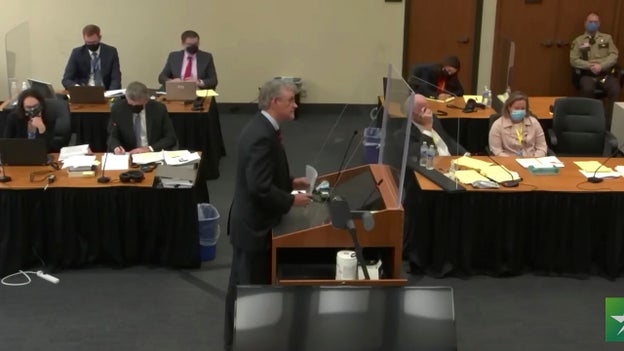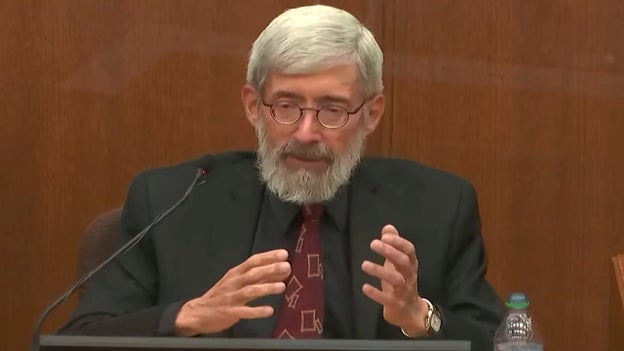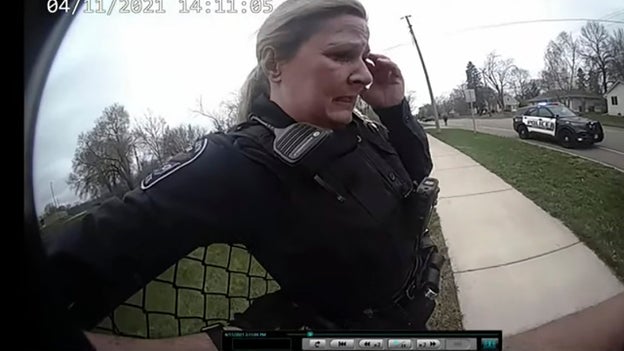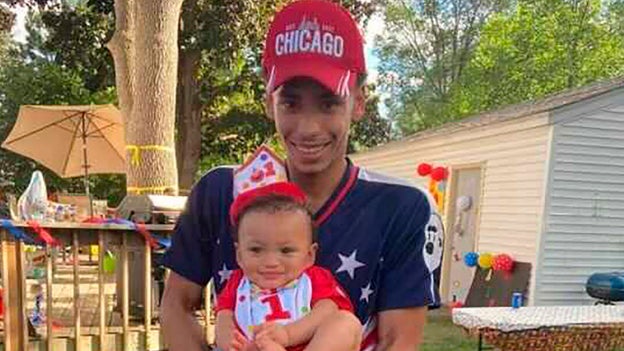Kim Potter trial: Defense rests after former police officer completes testimony: LIVE UPDATES
Kim Potter, the veteran former Brooklyn Center police officer, took the stand before the defense rested its case in her Minneapolis manslaughter trial. Potter, 49, shot and killed 20-year-old Daunte Wright in April 2021.
Coverage for this event has ended.
Judge Regina Chu is discussing jury instructions with the prosecution and defense ahead of Monday, when the both sides are expected to deliver their closing argument and the jury is likely to begin deliberating Kim Potter's fate.
Potter is charged with first- and second-degree manslaughter. She faces up to 15 years in prison if convicted on the highest count.
After hours of questioning from both the defense and prosecution teams, Kim Potter completes her testimony and steps down from the stand.
Defense attorney Earl Gray announces the defense has rested its case.
Judge Regina Chu tells the panel of jurors she will deliver jury instructions on Monday morning. Jurors are sent home for the day.
Defense attorney Earl Gray asks Kim Potter more questions about what she told Dr. Miller, the police psychologist hired by the defense, during the initial interview after the shooting.
He also asks her if she had ever shot her gun during her career -- she says no -- and asks her if she ever had to fire her Taser at someone -- again, she says no.
After taking several turns questioning Potter, both sides finish and Potter's testimony is complete.
Prosecutor Erin Eldridge is now questioning Potter on her statements about her loss of memory following the shooting.
Eldridge: "But didn't you tell Dr. Miller that you remember seeing the gun in your right hand? You said that, right?"
Potter: "I don't remember my interview with him. I was distraught, I wasn't in a good place."
Eldridge is now asking Potter about her actions, or alleged lack thereof, following the shooting.
Eldridge: "After you shot Daunte Wright, you didn't behave like someone who had just saved Sgt. Johnson's life. Did you?"
Potter: "I was very distraught. I just shot somebody. I've never done that."
Potter grows upset again, and begins to cry. Eldridge continues her questioning:
"You'd agree that as a police officer, you have the duty to render aid and communicate information to other officers, right?"
Potter: "Yes."
Eldridge: "And it's part of your job to assist those who are hurt or injured, true? ... And to communicate to other officers what you know about a particular scene, right? ... Give them whatever information you can to help them do their jobs, to help render assistance, things like that, right?"
Potter says yes.
Eldridge: "But you didn't do any of those things on April 11th, did you? ... You didn't communicate what happened over the radio, right? ... You didn't make sure any officers knew what you had just done, right? ... You didn't run down the street and try to save Daunte Wright's life?
Potter, through tears, says no.
Eldridge: "You were focused on what you had done because you had just killed somebody."
Potter, near sobbing, says:" I'm sorry it happened," as she audibly cries. "I'm so sorry .. I didn't want to hurt anybody."
After pushing further, Eldridge turns the questioning over to defense attorney Earl Gray for re-direct examination.
During their questioning throughout the day, Eldridge and Potter have both briefly mentioned that, following the shooting, Potter allegedly said something to the effect of, "I'm going to jail" or "I'm going to prison."
Kim Potter has returned to the stand to continue cross-examination following a one-hour break.
Assistant District Attorney Eldridge has resumed her cross-examination.
New York City-based criminal defense attorney Julie Rendelman weighed in regarding Potter's morning testimony, telling Fox News Digital she thought Potter was "effective" in portraying the dangers of such a situation, but questioning Potter's statements about her lack of memory immediately following the shooting.
"There's no question when the incident happened, the emotion she felt, the screaming, the crying was real -- I don't think anyone could ever question that," said Rendelman, a former prosecutor. That said, she later added, "I'm not thrilled with answers such as, 'I don't remember any of that happening, and suddenly I remember things after my husband came.' ... I don't find that that credible."
Rendelman noted that it "certainly is possible" that Potter actually doesn't remember, but said she is "a bit skeptical when it comes to that."
"She was effective in portraying the fact that this is a terrifying situation -- every single time you stop a car, whether or not you've heard that the person has ever carried a gun or not, it's a high stakes situation. Now, you add to it the idea that someone has a warrant, someone has a potential warrant for a gun. And yeah ... you're even on more high alert, coupled with one of the officers being in a situation where they could potentially be pulled by the car if the victim does not comply and drives off," she explained. "It starts to explain a little better why nerves were so high."
She noted how Potter seemed "a little bit short" with Eldridge at times during the cross-examination, whereas, she was "much more emotional and maybe even a drop more soft spoken" when being questioned by her own team.
Potter's testimony resumed around 1:30 p.m. CT/ 2:30 p.m. ET, after an hour-long lunch break.
Prosecutor Erin Eldridge asks Kim Potter about the events of April 11, 2021. Eldridge begins by asking her about her responsibilities as field training officer for Officer Luckey.
Referring to past testimony, Eldridge says, "You testified that that morning, the morning of April 11th, you reviewed pursuit policy with Officer Luckey, correct?"
Potter: "That afternoon."
Epdridge: "OK, but that pursuit policy includes not shooting at the driver [or] occupants of a vehicle, right?"
Potter: "A moving vehicle."
Eldridge later asks Potter if she would agree "that you snapped your gun holster as you approached, right?"
Potter: "No, I wouldn't agree to that."
She then shows Potter a picture of what appears to be her hand on the right side of her holster, near her gun.
Eldridge: "You see yourself in that picture?"
Potter: "Yes."
Eldridge: "And you see your right hand on the right side of your duty [belt], though?
Potter: "Yes."
Eldridge: "Is your right hand on your firearm here."
Potter: "It's blurry."
Potter agrees it appeared Wright was going to flee and that Wright was ultimately able to get back into his vehicle. She agrees she did not see a weapon on Mr. Wright, and that Wright did not punch or kick anyone, and never made threats.
The prosecutor goes frame-by-frame through the moments before the shooting, pointing out a paper that appears to be in Potter's right hand before she transfers it to her left hand.
Potter sounds as if she is crying as Eldridge continues to go through the moments of the shooting.
Judge Chu orders an hour break for lunch. Cross-examination is expected to resume at 1:30 p.m. CT/ 2:30 P.M. ET
Potter agrees with prosecutor Erin Eldridge that she carried her firearm on her right side and her Taser on her left side. She had originally carried both on one side, but switched years before the shooting, she said.
Eldridge is now showing side-by-side images of both weapons, pointing out the differences in size and color between the handgun and Taser. The prosecutor asserts that Potter went out on the street with a Taser, "not knowing what that Taser did.
Potter says she has drawn her Taser while on duty "several times." When asked approximately how many times, Potter says: "For de-escalation, maybe a few times." She agrees she had never actually deployed her Taser.
Prosecutor Erin Eldridge is questioning Potter about her experience and the requirements of the job as a police officer in Brooklyn Center.
Potter concedes with Eldridge's questions that the "fundamental duty as a police officer is to safeguard life," and that she has "the duty to never employ unnecessary force." Eldridge is now asking specifically about her use-of-force training.
Eldridge: "Use of force can include things like restraints, handcuffs, defensive tactics, chemical irritants, using batons, Tasers, less-lethal weapons and firearms, as well, right? All those things are options available to you."
Potter: "Not all of them."
Eldridge: "OK, well, you carry a whole number of things on your duty belt every day, right?"
Potter: "Yes."
Eldridge: "And that includes a firearm and a Taser, right?"
Potter: "Yes."
Eldridge: "And you also had other items on that duty belt as well, correct?"
Potter agrees. Eldridge then asks, "And as part of the training that you went through every year, they cover topics, all kinds of uses of force, right?
Potter: "Yes." Potter later agrees she has had training on the "limitations on how and when to use that force" throughout her "entire career."
Potter also agrees when Eldridge asks if she was trained "year-after-year, at least the last 19 years." She says she started wearing a Taser on her belt in 2005.
The prosecutor points to the police department's Taser policy, which states that training includes: "Performing reaction-hand draws or cross-draws to reduce the possibility of accidentally drawing or firing a firearm." Potter agrees she signed the document every year.
After asking Officer Luckey several times what was going on, Wright -- whom Potter identifies as "the driver" -- agrees to step out of the car, Potter says.
Potter: "Officer Luckey had him turned around and I think he was still asking what was going on. ... And Sgt. Johnson and Luckey told him he was under arrest and I told him he had a warrant."
"Officer Luckey had put his hands behind his back and I noticed that in the driver's right hand with some type was something it was paper or something. And I took it out of his hand and had it in my left hand."
"Officer Lucky started to say something about, 'Don't do that. Don't tense up. Stop doing that.' And then it just went ... chaotic."
Gray: "What do you remember happening after that?"
Potter: "I remember a struggle with Officer Luckey and the driver at the door. The driver was trying to get back into the car."
Potter begins to get upset, pausing in between her continued testimony, as she further describes what happens.
Potter: "I went around Officer Luckey as they're trying to get back in the door. I'm between the door and Officer Luckey ... and the driver's getting into the car ... They're still struggling. And I can see Sgt. Johnson and the driver struggling over the gearshift because I can see Johnson's hand and then I can see his face ... He had a look of fear on his face."
Potter continues: "We were trying to keep him from driving away. It just it just went chaotic. It and then I remember yelling, 'Taser, Taser, Taser.'"
"And then," Potter starts to cry, "he told me I shot him."
She says she has trouble remembering the events that followed the shooting, up until about the point she was taken the the police station house. Potter says she resigned just a day or two after the shooting out of concern that there would be repercussions for the city. She has since moved out of state.
Gray turns testimony over to the prosecution for cross-examination.
Kim Potter tells the jury what she remembers about first seeing the white Buick that Daunte Wright was driving:
"Officer Luckey and I were driving south ... we were talking about pursuit policies, doing some regular FTO training. And he observed a vehicle in the turn lane with a blinker on inappropriately ... We discussed a little bit of suspicious activity. He noticed a pine tree or air freshener hanging from the rearview mirror and the tags were expired."
Defense attorney Earl Gray asks Potter if she would have stopped the vehicle if she were on patrol alone that day.
Potter: "Most likely not."
She explains: "During the COVID times, the high COVID times, the Department of Motor Vehicles was so offline that people weren't getting tabs. And we were advised not to try to enforce a lot of those things because the tabs were just not in circulation."
Gray: "But you did stop the vehicle, right?"
Potter: "Yes. Part of field training is that a probationer would make numerous contacts with the public throughout the day ... We ran the vehicle and confirmed that the registration was expired and that the registered owner had a petty misdemeanor type warrant for some type of drug offense."
Potter says she got out of the vehicle with Luckey.
"Officer Lucky walked up to the driver's door and I stood at the right corner of the white Buick," she recalls.
When asked why she stood where she did, she said: "Part of it was so I could see where Officer Luckey was, and to provide cover to see what else was in the vehicle."
Gray: "In your experience of 26 years, and being a patrol officer all those years, you stopping any vehicle at any time that you don't know, is that be considered a dangerous situation?"
Potter: "Yes."
Gray: "Why?"
Potter: "Sometimes there's guns in the car, sometimes there's uncooperative people. You don't know who you're stopping."
She explains that Officer Luckey called for a second squad car after getting Wright's information -- just to have a backup officer because the driver had a warrant, she said.
After running Wright's DMV information, Potter says, Wright's record shows a suspended license, a gross misdemeanor bench warrant for weapons, and a protective order.
Luckey also told Potter at the time that there was an "obvious" smell of marijuana, Potter testifies.
Under questioning from defense attorney Earl Gray, Kim Potter says she did attend all training sessions required by Brooklyn Center Police Department.
"We spent a lot more time on firearms [training] than we did on Tasers," Potter says,
Potter says Tasers did not come into being until 2002 or 2003 -- about seven or eight years after she was sworn in.
She agrees that the Taser she had at the time of the Daunte Wright shooting was "shaped like a gun."
...
Gray: "With respect to weapons confusion, was there ever any training -- any actual training -- about weapons confusion as you remember it?"
Potter: "No."
Kim Potter testifies she was a member of a police explorer program in college. After graduation, she attended a "hands-on" police skills training, which she refers to as "skills."
While waiting to obtain her "skills" training certification, she worked as a security officer at the Anoka State Hospital.
She was hired by Brooklyn Center Police Department in 1995, and was sworn in on Feb. 27.
She says she has served as a police explorer advisor, field training officer, a crisis negotiator, a member of the Law Enforcement Memorial Association Honor Guard. She says she also “did a lot of crime prevention work.”
Regarding the Honor Guard work, Gray asks Potter: “When you were doing the carrying caskets for that program, were you aware of officers that were killed in the line of duty by making a traffic stop?”
Potter: "Yes."
The prosecution objects to this, but Judge Chu overrules the objection.
Potter says her husband, a retired police officer, is in the courtroom. She has two sons, she says, but neither is present -- one is an active-duty Marine and the other is a college student.
She says her mother and brother are in the courtroom.
Potter has her blonde hair down, and is wearing a light-colored patterned shirt and a yellow- or cream-colored sweater.
She is being questioned by defense attorney Earl Gray.
Former officer Kim Potter takes the stand to testify as she nears the end of her manslaughter trial for shooting and killing 20-year-old Daunte Wright during a traffic stop earlier this year.
Potter, 49, has been charged with first- and second-degree manslaughter for fatally shooting Wright during a traffic stop in Brooklyn Center, a Minneapolis suburb, on April 11, 2021.
The 26-year police veteran and other officers, including a trainee, were attempting to arrest Wright when he tried to get back into his vehicle, video shows.
She has said she mistook her handgun for her Taser when she opened fire.
The trial has resumed after a brief, 20-minute morning break.
Kim Potter is expected to testify shortly in her own defense. Before the jury is called to return to the courtroom, Judge Regina Chu asks Potter if her decision to testify remains the same. She responds, "Yes, your honor."
Chu then calls the jury into the courtroom.
Judge Regina Chu has called for a 20-minute morning break. The jury has left the courtroom, and is expected to return shortly before 11 a.m. CT/12 p.m. ET.
After approximately 45 minutes, Dr. Laurence Miller's testimony is turned over to the prosecution for cross-examination.
Prosecutor Erin Eldridge is questioning Dr. Miller about his background working with local and national police departments and organizations. She acknowledges that he is identified on one police website as a "police columnist." He agrees.
He is also being questioned about what he has written in some of these columns.
Miller also provided expert testimony in the murder trial for former Chicago police officer Jason Van Dyke, who was accused of fatally shooting Laquan McDonald in 2014. Van Dyke was ultimately convicted of second-degree murder and aggravated battery.
Prosecution cross-examines Dr. Miller for about 45 minutes. The defense and prosecution both return to the podium for one more brief round of questioning each.
Miller's testimony is now complete.
Day 12 of the manslaughter trial against Kim Potter begins with an expert witness.
Dr. Laurence Miller took the stand in the Hennepin County courtroom in Minneapolis shortly after 9 a.m. local time. Miller is a police psychologist who has been licensed since 1990, and specializes in clinical psychology, forensic psychology, applying to cases involving law, and police psychology.
He calls police psychology a "hybrid specialty," in which person will "apply behavioral science to various aspects of law enforcement." He has studied police psychology for 20 to 25 years, he says.
Miller notes that he charged the defense a flat fee of $30,000 for his involvement and testimony in the case.
All eyes are now on Kim Potter as the former suburban Minneapolis police officer is expected to testify in her own defense on Friday, Fox New Digital's Paul Best reports.
Potter, a 26-year police veteran, is facing first- and second-degree manslaughter charges after shooting and killing Daunte Wright, a 20-year-old Black man, in April when she mistook her Taser for her handgun.
After the prosecution rested its case Thursday morning, Judge Regina Chu asked Potter if she still wanted to testify.
"Yes, your honor," Potter responded, verbally addressing the court for one of the first times. "I’ll testify."
Read more here.
EXCLUSIVE: A previously undisclosed juvenile felony petition from Minneapolis alleges that Daunte Wright, who died in a police-involved shooting in April, was involved in yet another crime in 2017, Fox News Digital's Michael Ruiz reports.
Former Brooklyn Center Police Officer Kim Potter is on trial for Wright's death, facing first- and second-degree manslaughter charges.
Wright’s father, Arbuey Wright, took the stand Wednesday as a character witness to provide "spark of life" testimony regarding his son. He said they had a close-knit family, and his son held "a lot of different jobs," including one at a footwear store where the father was manager.
"It was great. It was challenging to work with my son," Aubrey Wright said. "I tried to let him understand the difference between, ‘We’re at work. I’m your boss,’ and, ‘At home, I’m your dad.'"
...
But court documents from multiple cases paint a portrait of Daunte Wright as a career criminal, not a gainfully employed family man.
Read more here.
Live Coverage begins here
